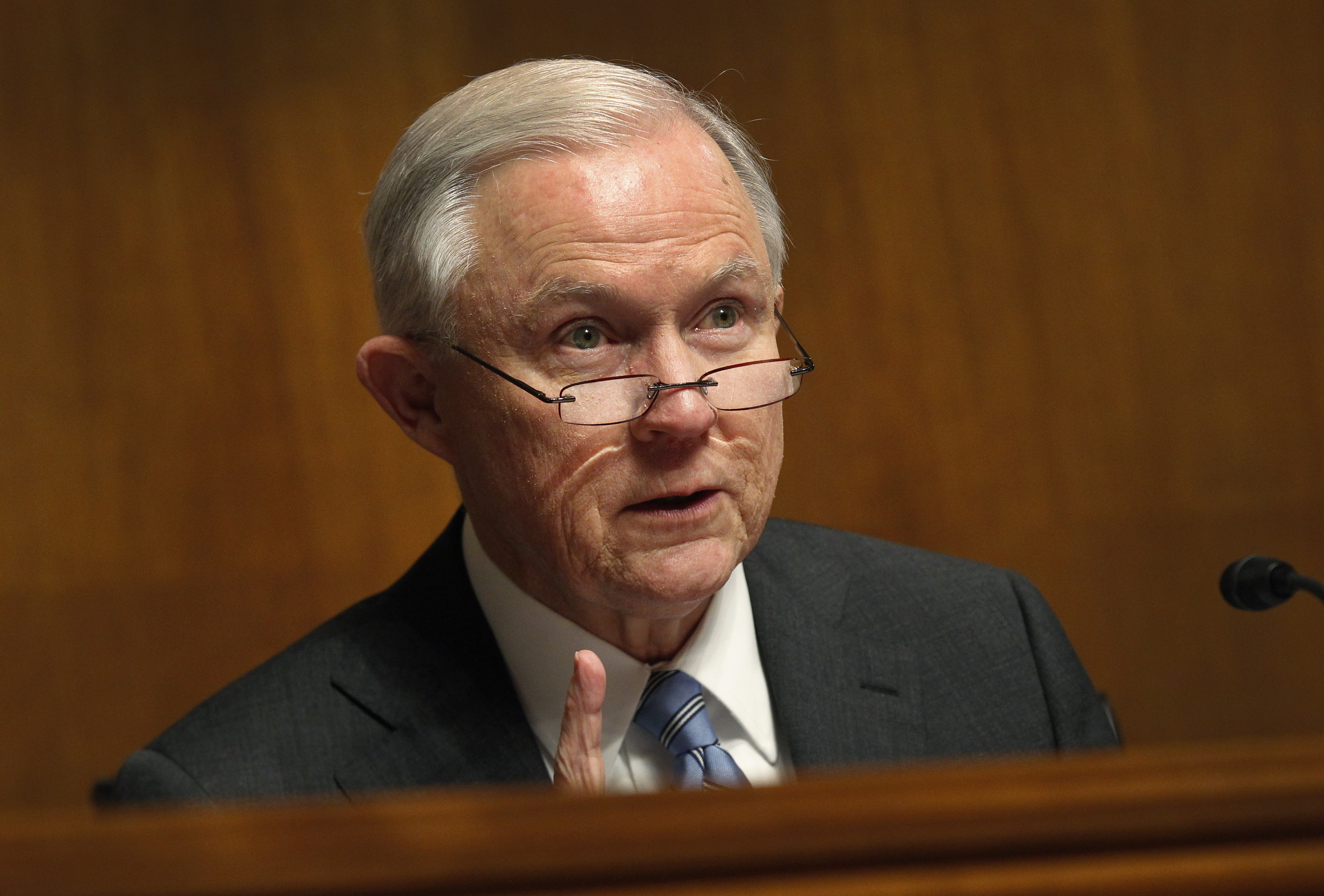By David Cole, ACLU Legal Director
Under almost any other circumstances, the firing of Attorney General Jeff Sessions would be a moment for dancing in the streets. Sessions oversaw a Justice Department that systematically undermined civil liberties and civil rights.
But his departure portends no improvement on these fronts. And the fact that President Trump fired him, notwithstanding his faithful advancement of the president’s agenda, should raise alarm bells.
Sessions leaves the Justice Department far less committed to justice than he found it. Under President Barack Obama, the department expanded the rights of LGBTQ individuals, responded aggressively to police abuse, directed federal prosecutors to use their charging discretion wisely to reduce mass incarceration, promoted voting rights, reduced reliance on private prisons and commuted lengthy sentences imposed on nonviolent drug offenders. Sessions could not reincarcerate the men and women whose sentences Obama commuted, but he reversed virtually everything else.
Read the full article at The Washington Post.
Date
Friday, November 9, 2018 - 9:45am
Featured image
Show featured image
Hide banner image
Related issues
Criminal Law Reform
Police Accountability
Show related content
Pinned related content
Statement on Jeff Sessions' resignation as Attorney General
Tweet Text
[node:title]
Type
Menu parent dynamic listing
Style
Standard with sidebar
America has spent the last 50 years becoming the world’s largest incarcerator. It’s gotten there with substantial help from elected local prosecutors, who have used their extraordinary power to lock people up in jails and prisons at unprecedented rates and for unconscionably long amounts of time.
The story of the 2018 primary season, however, has been the focus and energy on prosecutor races as one strategy to combat mass incarceration. More candidates are running, and more voters are paying attention to these races than ever before. Here is what has happened so far as well as a few more important prosecutor races that will be decided on Nov. 6.
St. Louis
Earlier this year, in St. Louis, a painstaking, years-long community organizing effort spearheaded by black-led organizations helped create an environment where Wesley Bell, a reform-minded black city council person, stepped forward to run on a reform platform. He then handily defeated 27-year incumbent Bob McCulloch. Given the lack of a Republican challenger, Bell will become prosecuting attorney on Nov. 7.
During his campaign, Bell pledged to reform cash bail, increase diversion, and bring unprecedented transparency to the office. Community activists and advocates, including the ACLU, are already hard at work preparing to ensure that Bell is held accountable to following through on his pledges.
Boston
In Boston, an unprecedented number of Democratic candidates ran to become the next district attorney in Suffolk County. All the top contenders pledged to address mass incarceration and racial disparities in the criminal justice system. The winner of the primary, Rachael Rollins, has pledged to enact bail reform and to stop prosecuting a number of offenses with stark racial disparities between Black people and white people, like shoplifting and “disturbing the peace.”
LEARN MORE ABOUT DISTRICT ATTORNEY RACES IN MASSACHUSETTS
Minneapolis
In Minneapolis, Mike Freeman, a six-term incumbent and president of the National District Attorneys Association, is being challenged by Mark Haase. Haase co-founded the Second Chance Coalition, a group that passed drug law sentencing reform in Minnesota in 2016. Haase has made reforms like ending cash bail and marijuana decriminalization priorities in his campaign and has stated. And in response to an ACLU survey that he would flatly refuse to prosecute cases involving racial bias.
Dallas
The district attorney race in Dallas also shows just how far things have come. Any appearance of being “soft-on-crime” for decades has been anathema to elected politicians, including prosecutors, in Texas’s third most populous city. The contrast between that history and the present day couldn’t be made any clearer than the pledge made by John Cruezot, the Democratic candidate for district attorney, that he will cut incarceration 15-20 percent by the end of his first term. He also promised to submit a written plan within the first 90 days in office showing how he’ll get there.
Cole County, Missouri
The movement away from tough-on-crime politics for prosecutors isn’t confined to big cities. Cole County, Missouri — home to the state’s capital, Jefferson City — voted 66 percent for Donald Trump. The Republican candidate for district attorney there, Locke Thompson, said in an ACLU questionnaire he supported eliminating cash bail for low-level misdemeanors. Even a couple days of incarceration can have severe consequences for employment and on families, and eliminating cash bail would ensure fewer people are exposed to these harms while reducing the nearly 6,000 people incarcerated in Cole County each year.
Jefferson County, Alabama
Finally, in Jefferson County, Alabama, home to Birmingham, district attorney candidate Danny Carr indicated that he would stop jailing people for low-level marijuana offenses. His announcement preceded a damning new report showing that Black people in Alabama are four times more likely than whites to be arrested for marijuana possession.
Reform Gains Traction
Even this shift in the way that prosecutors campaign would have felt unthinkable just a couple of years ago. Prosecutors used to campaign on who could lock the most people up. Now they’re recognizing that voters overwhelmingly demand reform and that momentum has continue to build despite the Trump Administration’s zeal for using lies and fear in support of dehumanizing, ineffective, and racist “tough-on-crime” policies.
COMPARE CANDIDATES AND GET THE FACTS
This year’s story on prosecutorial reform won’t be complete until after these elections happen, but regardless of the outcome, 2018 is shaping up to be a watershed year in terms of the number of voters who paid attention to these races and candidates adopting reform priorities that voters have overwhelmingly indicated that they’ve long wanted. 2018 has offered plenty of moments for optimism, while losses in California showed criminal justice reformers just how much more work there is left to do.
The work won’t end after Election Day. Once these reformers take office, we’ll be working to make sure that prosecutors making these promises are held accountable to following through and continuing the momentum in 2018 into 2019 and beyond.
Blog by Taylor Pendergrass, Senior Campaign Strategist, ACLU Campaign for Smart Justice.
Date
Tuesday, October 30, 2018 - 10:30am
Featured image
Show featured image
Hide banner image
Related issues
Criminal Law Reform
Show related content
Pinned related content
What a Difference a DA Makes
Poll: Mass. voters think criminal justice system is biased
Tweet Text
[node:title]
Type
Menu parent dynamic listing
Style
Standard with sidebar
A showdown between data privacy advocates and major tech firms is heating up in Congress, with one side arguing for robust regulations outlawing data discrimination and other exploitative practices, and the other pushing for a federal law to wipe out state level privacy protections. On October 10, the Senate Committee on Commerce, Science, and Transportation held its second hearing on consumer privacy. In September, tech companies pleaded their case, asking Congress to pass a federal law that would preempt state-level data privacy laws. At last week’s hearing, the committee heard from consumer advocates. Unlike the big tech representatives who testified at the first hearing, these advocates focused on consumer protection.
The message from these experts was clear: The United States desperately needs to catch up with Europe and pass a strong federal consumer privacy law, which must act as a floor—not a ceiling—for data regulation nationwide.
The issue facing Congress doesn’t get enough attention given its gravity. Companies like Google, Facebook, and Amazon collect and process unprecedented quantities of extremely sensitive information about hundreds of millions of people in the United States, but remain almost entirely unregulated. The axiom that knowledge is power has never been truer than it is today. It’s not an exaggeration to say that in the Information Age—the age of big data, automation, and artificial intelligence—she who controls information controls the world.
Unregulated, big data and “black box” automated decision systems have been shown to compound existing and historic inequalities, routinely producing outcomes that benefit the powerful and harm the poor, people of color, and women. Barely a week passes without news of another catastrophic data breach, or of a tech company with God-like powers getting caught in a scandal implicating the lives of millions of people currently at the mercy of Silicon Valley’s whims.
Advocates at the hearing last week sounded the alarm, recommending that Congress draw some firm lines in the sand around what companies should be permitted to do with the vast troves of records they collect about us, and highlighting the European Union’s General Data Protection Regulations as an example worth emulating. Laura Moy of the Georgetown Law Center on Privacy & Technology called on Congress to ban companies from digital redlining, or denying consumers information about educational or employment opportunities on the basis of their race, gender, or sexual orientation. Moy questioned the value of consent based data regulation, highlighting the disproportionate power the tech industry has in its asymmetric relationship with consumers. “Where a service is essential or unavoidable for consumers,” she warned, as so many big tech digital services are, “consent may not be freely given.”
Other advocates, like Massachusetts Senator Ed Markey, stressed the importance of protecting children’s privacy. He and Alastair Mactaggart, Board Chair of Californians for Consumer Privacy, said any federal consumer data law should include special protections for people under the age of 16, including the right for individuals to demand companies delete data amassed on them when they were juveniles. These protections are critical for all people, but especially for black and brown children already disproportionately targeted for surveillance, policing, and incarceration.
According to figures provided by the Center for Democracy and Technology’s Nuala O’Connor, people in the United States are overwhelmingly concerned that they’ve lost control over their personal information:
-
91% of adults in the United States agree or strongly agree that consumers have lost control of how personal information is collected and used by companies.
-
80% are concerned or very concerned about their online privacy.
-
68% believe that current laws are not good enough at protecting privacy online.
The witnesses made clear that Americans want comprehensive, strong consumer data privacy law, but that today it doesn’t exist.
The ACLU and others have at times asked big tech firms to self-regulate in the interest of ensuring their tools are only used in ways that support, rather than impede, civil rights and civil liberties. But the tech companies’ performances at the September 26 Senate hearing demonstrated that when it comes to comprehensive consumer data privacy regulation, big tech won’t do the right thing on its own. Lawmakers must step in.
Company claims that regulation will harm innovation or impose untenable cost burdens are overblown and exaggerated. Amazon, one among many astonishingly profitable big data players, is the most highly valued publicly traded company in the country, boasting more wealth than many nations. If we want to live in a free and open society, and exercise democratic control of our own lives, we must be able to control information about ourselves. Seizing this control back from major corporations requires lawmakers to act—at the federal level, and where needed, at the state level, too—in the public’s interest.
Data should never be used to discriminate, compromise individual liberty, or disrupt democracy. No matter what compromise emerges on these issues at the federal level, Congress must reject tech industry calls to prohibit states from enacting their own protections. The choices our lawmakers make now will have vast repercussions for the future. Let’s choose wisely.
This blog post was co-authored by Kade Crockford and Siri Nelson. Originally posted on Privacy SOS.
Date
Monday, October 22, 2018 - 3:00pm
Featured image
Show featured image
Hide banner image
Related issues
Privacy and Surveillance
Show related content
Tweet Text
[node:title]
Type
Style
Standard with sidebar
Pages


